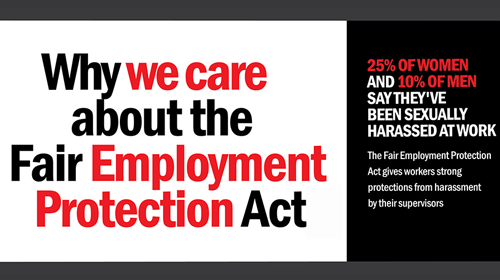
Meet Tony and Angela. Angela is a floor worker at a manufacturing plant and Tony is her shift supervisor. Tony’s boss, who works offsite, decides whom to hire or fire at this particular plant. But Tony makes Angela’s schedule, gives her time off, and decides whether she operates machinery or cleans the toilets on any particular day.
So who’s the boss? Not Tony, according to a Supreme Court decision handed down last summer.
In , the Supreme Court undercut protections for workers by severely narrowing the definition of supervisors like Tony. According to the Court, your boss is only the person who has the ability to hire or fire you, regardless of whether or not they manage your daily work. This may not sound like a significant change, but narrowing the definition of supervisor has big consequences. Why does it matter? Because if Tony harasses Angela, it’s now next-to-impossible for her to hold the company accountable.
Consider this scenario: Tony tells Angela that she “better give him what he wants,” or she will get back-to-back night and weekend shifts. He says he’ll make her work life “hell” and make her “pay” with even worse assignments if she doesn’t comply. Because Tony doesn’t have the authority to hire or fire employees, Angela has a much tougher standard to prove harassment and the company’s liability for Tony’s actions than she would’ve before the Vance decision. Lower-level supervisors without the power to take tangible employment actions will now be treated as just coworkers to whom a more difficult standard applies.
This standard is out of touch with the American workplace. For the average, low-level employee, who is the boss? It’s the person who controls her daily work life. The reality is that lower-level individuals with this authority, like Tony, are a common part of the America workplace. The Court’s decision rejects the fact that many employees have their daily activities dictated by bosses who do not have hiring power, and ignores the power and influence these individuals have over others, delegated to them by the company.
Unfortunately, harassment is still far too common in the American workplace. According to a national , a quarter of all female workers and ten percent of men have experienced some form of sexual harassment at work. By limiting the definition of supervisor, the Vance decision seriously limited the power to fight harassment. This particularly affects those in low-wage jobs like Angela, who may have little or no interaction with the person who has the ultimate authority to hire or fire her.
The Fair Employment Protection Act, federal legislation introduced today in both the House and Senate, restores the critical protections against workplace harassment lost in last year’s Vance decision. The bill would amend several federal nondiscrimination laws to make clear that employers will be responsible for harassment by individuals with the authority to control the daily activities of other employees, while leaving in place the current standards for bosses who can take tangible employment actions and for those who are merely coworkers. It also restores incentives for employers to properly train employees in positions of authority to prevent harassment.
Defining your boss as the person who oversees your day-to-day work is nothing new. The Vance decision merely changed a longstanding definition held by some courts and the . This bill reflects the reality of the workplace and will help to stop harassment by providing incentives for employers to prevent and remedy it. Tony and Angela may be fictional, but their situation is very real. It should be clear to employees, employers, and the courts who the boss is.
Learn more about sexual harassment and other civil liberty issues: Sign up for breaking news alerts, , and .

